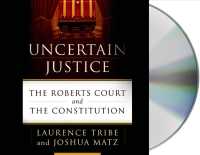- ホーム
- > 洋書
- > 英文書
- > Business / Economics
Full Description
Maximize understanding and prepare students for future learning and careers in accounting and business. Financial Accounting, Twelfth Edition enhances its focus on real-world decision-making processes with data analytics and insights while retaining the pedagogy on which users have come to rely. Thorough coverage of procedures, early introduction of the Accounting Cycle from a corporate perspective, and robust assignment content provide a solid foundation for learning the essential concepts, techniques, and methods of financial accounting.
Contents
1 Accounting in Action 1-1
1.1 Accounting Activities and Users 1-3
1.2 The Building Blocks of Accounting 1-7
1.3 The Accounting Equation 1-13
1.4 Analyzing Business Transactions 1-15
1.5 The Four Financial Statements 1-22
2 The Recording Process 2-1
2.1 Accounts, Debits, and Credits 2-3
2.2 The Journal 2-9
2.3 The Ledger and Posting 2-12
2.4 The Trial Balance 2-24
3 Adjusting the Accounts 3-1
3.1 Accrual-Basis Accounting and Adjusting Entries 3-2
3.2 Adjusting Entries for Deferrals 3-8
3.3 Adjusting Entries for Accruals 3-16
3.4 Adjusted Trial Balance and Financial Statements 3-24
4 Completing the Accounting Cycle 4-1
4.1 The Worksheet 4-3
4.2 Closing the Books 4-8
4.3 The Accounting Cycle and Correcting Entries 4-15
4.4 The Classified Balance Sheet 4-19
5 Accounting for Merchandising Operations 5-1
5.1 Merchandising Operations and Inventory Systems 5-3
5.2 Recording Purchases Under a Perpetual System 5-7
5.3 Recording Sales Under a Perpetual System 5-11
5.4 The Accounting Cycle for a Merchandising Company 5-16
5.5 Preparing the Multiple-Step Income Statement 5-19
6 Inventories 6-1
6.1 Classifying and Determining Inventory 6-2
6.2 Inventory Methods and Financial Effects 6-7
6.3 Effects of Inventory Errors 6-17
6.4 Inventory Presentation and Analysis 6-19
7 Fraud, Internal Control, and Cash 7-1
7.1 Fraud and Internal Control 7-3
7.2 Cash Controls 7-12
7.3 Control Features of a Bank Account 7-19
7.4 Reporting Cash 7-28
8 Accounting for Receivables 8-1
8.1 Recognition of Accounts Receivable 8-3
8.2 Valuation and Disposition of Accounts Receivable 8-5
8.3 Notes Receivable 8-15
8.4 Presentation and Analysis of Receivables 8-20
9 Plant Assets, Natural Resources, and Intangible Assets 9-1
9.1 Plant Asset Expenditures 9-3
9.2 Depreciation Methods 9-8
9.3 Plant Asset Disposals 9-18
9.4 Natural Resources and Intangible Assets 9-21
9.5 Statement Presentation and Analysis 9-27
10 Liabilities 10-1
10.1 Accounting for Current Liabilities 10-3
10.2 Characteristics of Bonds 10-9
10.3 Accounting for Bond Transactions 10-14
10.4 Accounting for Long-Term Notes Payable 10-20
10.5 Presentation and Analysis 10-23
11 Corporations: Organization, Stock Transactions, and Stockholders' Equity 11-1
11.1 Corporate Form of Organization 11-3
11.2 Accounting for Common, Preferred, and Treasury Stock 11-12
11.3 Accounting for Dividends and Stock Splits 11-19
11.4 Reporting and Analyzing Stockholders' Equity 11-28
12 Statement of Cash Flows 12-1
12.1 Usefulness and Format of the Statement of Cash Flows 12-3
12.2 Preparing the Statement of Cash Flows — Indirect Method 12-6
12.3 Analyzing the Statement of Cash Flows 12-17
13 Financial Analysis: The Big Picture 13-1
13.1 Sustainable Income and Quality of Earnings 13-3
13.2 Horizontal Analysis and Vertical Analysis 13-9
13.3 Ratio Analysis 13-15
Appendix A Specimen Financial Statements: Apple Inc. A- 1
Appendix B Specimen Financial Statements: PepsiCo, Inc. B- 1
Appendix C Specimen Financial Statements: The Coca-Cola Company C- 1
Appendix D Specimen Financial Statements: Amazon.com, Inc. D- 1
Appendix E Specimen Financial Statements: Walmart Inc. E- 1
Appendix F Time Value of Money F- 1
Appendix G Reporting and Analyzing Investments G- 1
Appendix H Payroll Accounting H- 1
Appendix I Subsidiary Ledgers and Special Journals I- 1
Appendix J Accounting for Partnerships J- 1
Appendix K Other Significant Liabilities K- 1








